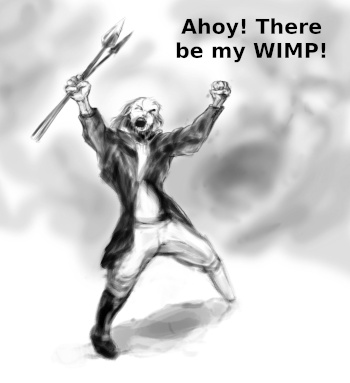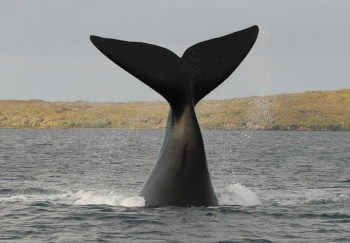Warm Whales
April 24, 2023
There are 17,500 people participating in searches for
theoretically predicted elementary particles at
CERN.[1] There's a smaller number of
literati who search for the
conjectured Great American Novel, a
novel whose
narrative captures an essential aspect of being
American. This is a
moving target, since what was American in the
19th century is different from that of the early
21st century.
An early
candidate for the Great American Novel was
Uncle Tom's Cabin,
published in 1852 by
Harriet Beecher Stowe (1811-1896). Another is
Moby-Dick by
Herman Melville (1819-1891), published in 1851. Moby-Dick has 136
chapters, plus an
epilogue, and it's fundamental
plot is known by all. Perhaps one CERN
physicist or another in his/her
quest for some
elusive particle can be compared with
Captain Ahab in his quest for the
sperm whale,
Moby Dick. One aspect of this book is that it's presently read just by
students as a required
school assignment. The reason for this is that it's a
boring book.[2]

Captain Ahab on his hunt for the elusive WIMP, a weakly-interacting massive particle thought to be a possible origin of dark matter.
In chapter 113 of Moby-Dick, Captain Ahab asks a blacksmith to make a harpoon, not using water as a quench, but blood.
(Wikimedia Commons image by Pete Simon, modified. Click for larger image.)
Moby-Dick is boring, since the well known plot is intermixed with too much detail about the 19th century
whaling industry. It's
assessed that 75% of the book is
filler material.[2] As if
motivated by being
paid by the
word, Melville writes about
whale anatomy, including the
skull shapes of sperm whales, the
history of whaling, and whaling
techniques and
equipment.[2] Moby-Dick is first on a list of five
classic novels not worth reading.[3] A
Google search for
Moby-Dick is boring yields more than two million results.
To decide for yourself,
Project Gutenberg has a
free download of Moby-Dick in various
formats.[4] In the past, when
brick and mortar book
stores were prevalent, it was easy to flip to
random pages of a book to get an idea of its
content. I've written a short
C language program (
source code here (browse.c)) that gives random
sentences from a book text file. The program is compatible with the
UTF-8 files at Project Gutenberg. Here's one such snippet from the
2701-0.txt file of Moby-Dick.
There are those this day among them, who, though intelligent and courageous enough in offering battle to the Greenland or Right whale, would perhaps - either from professional inexperience, or incompetency, or timidity, decline a contest with the Sperm Whale; at any rate, there are plenty of whalemen, especially among those whaling nations not sailing under the American flag, who have never hostilely encountered the Sperm Whale, but whose sole knowledge of the leviathan is restricted to the ignoble monster primitively pursued in the North; seated on their hatches, these men will hearken with a childish fireside interest and awe, to the wild, strange tales of Southern whaling.

Southern right whale (Eubalaena australis).
One distinguishing characteristic of the southern right whale is the absence of a dorsal fin.
Photo by the University of Auckland southern right whale Auckland Islands research team
The unusual
weather that's
plagued the
United States last
winter should be enough to convince the
skeptical that
climate change is upon us.
Sea temperatures are rising as a consequence of
global warming, as evidenced by
rising sea level caused by
thermal expansion of
seawater.[5] Many
sea creatures are sensitive to this temperature rise, and the more mobile are
migrating to cooler parts of the
oceans. Ocean
foragers, including whales, have been forced to move to the areas to which their food sources have migrated.
Evidence for this is found in a recent
paper in the
Proceedings of the National Academy of Sciences authored by a huge international team from more than thirty
research institutions, including the
University of Groningen (Groningen, The Netherlands), the
University of Auckland (Aotearoa, New Zealand), the
University of Tasmania (Hobart, Australia), the
British Antarctic Survey (Cambridge, United Kingdom), the
Universidad Nacional del Centro de la Provincia de Buenos Aires (Buenos Aires, Argentina), and the
National Oceanic and Atmospheric Administration (NOAA, Seattle, Washington).[6-7] The lead author of the paper was
Solène Derville of Oregon State University.[6-7]
Southern right whales are a a wide-ranging marine predator, living from about 30°S
latitude up to
Antarctic ice, more than 60°S latitude.[6-7] They are large, slow-moving whales of mostly black color with no
dorsal fin, a V-shaped
blowhole, and a white
callosity on their
heads.[7] They
eat the small
crustaceans,
krill and
copepods.[7] Right whales were
hunted to near
extinction, and their
global population fell to a low of 500. The
species recovered, somewhat, and by 2009 there were an estimated 2,200 in
New Zealand waters.[7]
The right whale study examined
contemporary whale
skin samples and whaling
records back to 1792 that show how southern right whales have altered their
feeding habits.[7] A total of 1,002 skin samples from six
genetically distinct southern right whale populations were analyzed for
carbon and
nitrogen isotopes in a
methodology that accounted for both
spatial and
temporal variation in the
Southern Ocean phytoplankton isotope distribution.[6] The historical isotope distributions were compared with the contemporary distributions during the same
seasons.[6] This
analysis revealed changes in the whales' feeding patterns in recent
decades.[7]
The foraging grounds have shifted in the past thirty years, particularly in high latitudes, and this shift is likely caused by climate-associated changes in
prey availability; that is, the whales were forced to relocate to where their prey could be found.[6-7] In the last thirty years, the southern right whales increased their foraging of mid-latitudes in the
South Atlantic Ocean and southwest
Indian Ocean in the late
austral summer and
austral autumn.[6] They likewise slightly increased their high-latitude (greater than 60°S) foraging in the
Southwest Pacific Ocean.[6] As the authors state, such monitoring of marine predators may enable the tracking of
anthropogenic effects on
aquatic ecosystems.[6]
References:
- 2017 statistic from CERN Website.
- liz larsen, "Why 'Moby-Dick' is Awful," The Junction Journal, February 24, 2020.
- Rachel Hall, "5 Classic Novels Not Worth Your Time," studybreaks.com, June 30, 2018.
- Herman Melville, :Moby-Dick; or The Whale," Project Gutenberg. The Plain Text, UTF-8, file (1.2 MB) is found here.
- Understanding Sea Level - Thermal Expansion, NASA Website.
- Solène Derville, Leigh G. Torres, Seth D. Newsome, Christopher J. Somes, Luciano O. Valenzuela, Hannah B. Vander Zanden, C. Scott Baker, Martine Bérubé, Geraldine Busquets-Vass, Kris Carlyon, Simon J. Childerhouse, Rochelle Constantine, Glenn Dunshea, Paulo A. C. Flores, Simon D. Goldsworthy, Brittany Graham, Karina Groch, Darren R. Gröcke, Robert Harcourt, Mark A. Hindell, Pavel Hulva, Jennifer A. Jackson, Amy S. Kennedy, David Lundquist, Alice I. Mackay, Petra Neveceralova, Larissa Oliveira, Paulo H. Ott, Per J. Palsbøll, Nathalie J. Patenaude, Victoria Rowntree, Mariano Sironi, Els Vermeuelen, Mandy Watson, Alexandre N. Zerbini, Emma L. Carroll, "Long-term stability in the circumpolar foraging range of a Southern Ocean predator between the eras of whaling and rapid climate change," Proceedings of the National Academy of Sciences, February 27, 2023, DOI: 10.1073/pnas.2214035120
- Centuries of whaling data highlight likely climate change effect, University of Auckland Press Release, March 1, 2023.
Linked Keywords: Theory; theoretically; prediction; prediction in science; predicted; elementary particle; CERN; intellectual; literati; conjecture; conjectured; Great American Novel; novel; narrative; America; American; motion (physics); moving target; 19th century; 21st century; candidate; Uncle Tom's Cabin; literature; publish; Harriet Beecher Stowe (1811-1896); Moby-Dick; Herman Melville (1819-1891); chapter (books); epilogue; plot (narrative); physicist; quest; elusive; Captain Ahab; sperm whale; Moby Dick (whale); student; coursework; school assignment; boredom; boring; book; Captain Ahab on his hunt for the elusive WIMP; hunting; hunt; WIMP, a weakly-interacting massive particle; dark matter; blacksmith; harpoon; water; quenching; quench; blood; Wikimedia Commons; whaling industry; assess; assessed; filler (media); filler material; motivation; motivated; payment; paid; word; whale; anatomy; skull; geometry; shape; history; technology; technique; fixed asset; equipment; classic; Google search; Project Gutenberg; open-source model; free download; file format; brick and mortar; retail; store; randomness; random; page (paper); content (media); C language program; source code; browse.c; sentence (linguistics); UTF-8; intelligence; intelligent; courage; courageous; battle; bowhead whale; Greenland; professional; inexperience; ability; incompetency; confidence; timidity; competition; contest; nation; sailing ship; flag of the United States; American flag; knowledge; leviathan; ignoble; monster; North; door; hatch; child; childish; fireplace; fireside; awe; wilderness; wild; traditional story; strange tale; South; Southern; Southern right whale; Eubalaena australis; characteristic; dorsal fin; University of Auckland southern right whale Auckland Islands research team; weather; plagued; United States; winter; skepticism; skeptical; climate change; sea; temperature; global warming; sea level rise; rising sea level; thermal expansion; seawater; marine life; sea creature; fish migration; migrating; ocean; foraging; forager; scientific literature; paper; PNAS; Proceedings of the National Academy of Sciences; author; research institution; University of Groningen (Groningen, The Netherlands); University of Auckland (Aotearoa, New Zealand); University of Tasmania (Hobart, Australia); British Antarctic Survey (Cambridge, United Kingdom); National University of Central Buenos Aires; Universidad Nacional del Centro de la Provincia de Buenos Aires (Buenos Aires, Argentina); National Oceanic and Atmospheric Administration (NOAA, Seattle, Washington); Solène Derville; latitude; Antarctic; ice; dorsal fin; blowhole (anatomy); callosity; head; eating; eat; crustacean; krill; copepod; hunting; hunted; extinction; population ecology; global population; species; New Zealand; exclusive economic zone; waters; contemporary history; skin; sample (material); document; record; feeding; habit; genetics; genetically; carbon; nitrogen; isotope; methodology; three-dimensional space; spatial; time; temporal; Southern Ocean; phytoplankton; season; data analysis; decade; predation; prey; South Atlantic Ocean; Indian Ocean; austral summer; austral autumn; Southwest Pacific Ocean; human impact on the environment; anthropogenic effect; aquatic ecosystem.